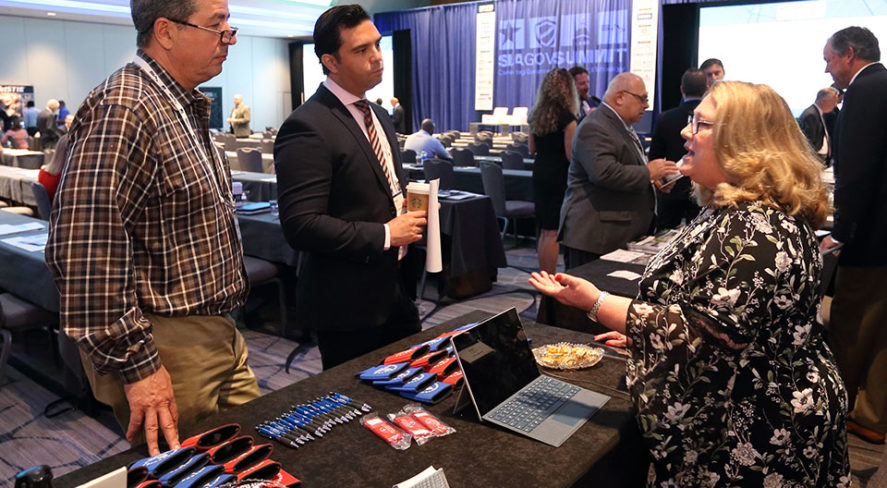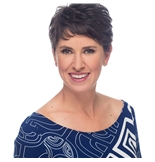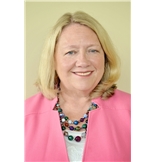ISC West Session Preview: Being a Woman Business Owner in the Security Industry Is an Advantage, Not a Disadvantage

ISC West 2019 is quickly approaching! In addition to great networking, special events and new products and technologies, attendees have access to 85+ top-quality training sessions through SIA Education@ISC. One key session to add to your calendar: Being a Woman Business Owner in the Security Industry Is an Advantage, Not a Disadvantage on Tuesday, April 9!
This session will feature a panel of successful female security business owners – a supplier, an integrator, a recruitment firm and a government security contracting consultant – sharing what led them to start their businesses and the advantages of being a woman in the security industry. Moderator Maureen Carlo, business development manager at BCDVideo and committee co-chair of the Women in Security Forum, and panelists Christine Lanning, president of Integrated Security Technologies; Rebecca Bayne, president of BCSI – Bayne Consulting & Search, Inc.; Lynn de Séve, president of GSA Schedules, Inc.; and Eddie Reynolds, CEO of iluminar Inc., will offer words of wisdom, encouragement and tips to other entrepreneurs and companies interested in the benefits of diversification of their workforce and strong potential business partners.
SIA spoke with Carlo and the panelists about what attendees can expect at this engaging session.
What are you looking forward to in this panel and in other offerings around women in security at ISC West?

Maureen Carlo: Our Women in Security Forum Breakfast @ ISC West on Friday, April 12, has a sensational speaker. When I started following Juliette Kayyem, I learned of her love for Dolly Parton and discovered the quote “If you don’t like the road you’re walking, start paving another one.” The ladies on our ISC West panel are not just women in security – they are leaders in security. Our diverse and specialized pairing of panelists represent a variety of businesses within the physical security world, including systems integration, recruitment and consulting, government contracting specialist and hardware manufacturer. It is smart to invest in women, and these women were all smart to invest in themselves.
The goal of our panel is to share the wisdom these women have learned throughout their careers, through their never-ending tenacity and grit. We’ll explore what the security industry can afford us when we allow ourselves to be relevant and viable, have vision and are willing to hustle and to bring it to fruition. No matter the pushback, these industry leaders have prevailed. Their stories and successes will inspire.
What advantages or opportunities do you see for women business owners in our male-dominated industry?

Rebecca Bayne: No matter what industry is being considered, dominance of one gender will not be a reason for success or failure – but the minority gender, because of rarity, has an opportunity to shine. On a race track of yellow cars, one red car will stand out immediately, partially because the color variation initially commands attention. If that red car does not perform well or – at a minimum – stay in the race, no one will care that the red car was ever there. But when the red car performs well and – per chance – wins the race, then we all want to know WHY. We will all start watching the red car! What did the red car have or do differently than all of the yellow cars? We will all be excited to see more red cars in more races!
Without making stereotypical statements about strengths or skills men have over women or women have over men, if we identify the thing we do which is a true strength, our superior performance can be quickly recognized and can be the catalyst for our accelerated success. We truly can shine and stand out from the competition, male or female, but our performance MUST be strong, consistent and reliable!

Christine Lanning: Government has a classification for a woman-owned business, where the U.S. Department of Defense can sole source opportunities to those businesses majority owned by women. Certain Fortune 500 companies also have a diversity program where they favor diversity businesses (of which women-owned businesses are a part). This is called supplier diversity, and it’s actually profitable for business.
“On average, supplier diversity programs add $3.6 million to the bottom line for every $1 million in procurement operation costs,” writes Lindsay Clark, referencing a 2015 study by the Hackett Group. “The high return on investment is undeniable…A positive ROI that boosts socially conscious reputation should push supplier diversity to the forefront of business strategy.”
Do you still get challenged as a business owner because you’re a woman? Do women entrepreneurs feel pressured to act a certain way?

Eddie Reynolds: Yes, I do get challenged as a woman. I’m not taken as seriously as male-owned businesses that offer the same products. Some people think that I don’t know what I’m doing or I’m not as technical as my male counterparts, and sometimes I’m spoken to in a patronizing way. Luckily, this has changed quite a bit. I’ve had to come off a bit strong to gain attention and respect.
Have your male peers supported you along the way, or is there lack of support?
RB: I have experienced GREAT support from male professionals in the industry along the way, as long as they were not in a position of direct competition with me! If they were a true peer or supervisor OR perceived me as competition, then the reaction I received was often doubt about my odds for success rather than support. Outside of that, the support I’ve received from males in our industry has been mostly excellent!

Lynn de Séve: I have been fortunate in my business life to have encountered some very special people who helped me along the way. Certainly, my male peers provided both encouragement and opportunities to advance my career when many of my counterparts were stuck in administrative positions without a chance to advance. The collaboration of successfully working together on challenging projects helped not only to sharpen my skills, but also to spark my confidence in taking a chance.
I stepped out into the unknown world of government sales with a push and a dare. The security community was an exciting experience. I worked hard. I received the support I needed to grow in an exciting field but also to start a business where there were few women participating. The collaboration with these gentlemen treating me not just as an equal in a male-dominated industry, but also protecting me from those that did not include me. I am grateful to have been appreciated for my efforts. My dedication and collaboration were rewarded by their referrals and confidence.
Sadly, I’ve lost a few along the way, such as my dear friend and widely respected security industry rep Brian Dolan, to whom I owe so much. I am delighted to have some very special guys in my business life. We laugh, we are loyal and we support each other and share great stories of our adventures in the security industry.
CL: I have had many male supporters along the way. My husband is my biggest supporter. Every once in a while, I’ll come across someone who doesn’t value women – and it’s usually those people I spend the least amount of my time and energy on.
Why is diversity in the workplace and industry so important?
RB: Our industry protects people and property; there is no limitation of diversity in those we serve! It would make sense, then, that the delivery of this service will be stronger, more balanced and more conscientious and bring greater value when it is provided by an equally diverse talent pool and business community. Additionally, how can we grow toward greater perfection and success if the representation of the industry is narrow vs. diverse? This is critical today more than ever!
What was the major driver in pursuing your own business?
RB: My key goal, to become the BEST provider of our core service (focused, detail-oriented and passionate search, recruitment and consulting for security integrators) was never going to happen in the company where I was. Simple and direct, the only way I could pursue and realize this goal was to step out and drive this in a new company which would deliver, with passion, the quality I always felt was necessary for the service to be considered truly the best.
LD: Survival! In the 1980s I had been working for some well-connected small businesses in Washington, D.C. I made some great contacts with government stakeholders during this time that would help me later. I had a unique and rewarding learning experience in helping teach and advise small minority companies to do business with the government. But the business I was working for, although well connected, did not have their finances in order.
After getting stuck with expenses that were not in the cash flow budget and dealing with bouncing paychecks, this single mother of two decided she would be better off creating her own opportunities. The company where I worked closed their doors, leaving me on the hook for substantial expenses on their behalf. I could not imagine this would happen to me. Tired of the betrayals, I decided a new path was in order.
I approached an executive with a company I had collaborated with in the past to expedite products to the government. I promoted an opportunity for us to create a government sales program for his division. This kind gentlemen jumped at the opportunity and offered me a salary and benefits and allowed me to pursue my consulting company at the same time as I helped to grow his government business. Later, after his retirement, he would call me a few times a year to check up on me and revel in the success of our efforts. We talked about the good friends in government services we had made along the way.
ER: The major drive for me was it was difficult for me to get a high-level position and higher pay. I saw my male counterparts getting promoted and raises, even though I outperformed them year after year. If I spoke up about it, I was frowned upon and thought of as rebellious. I knew I could run a branch or be an excellent general manager if given half the chance. I saw that the only way to get what I wanted was to start my own business.
What is your best advice for a woman business owner in the security industry?
RB: Be the red car on the racetrack filled with yellow cars, but don’t expect to be recognized or think you can win just because you’re red. Hone your greatest strength to be a standout, and don’t give up. Don’t expect to work less or even as much as others if you want to be the best. Don’t be afraid to recognize, embrace and develop the way you can become exceptional – then build your business with this always in mind, and never, never, never compromise.
ER: Never give up! Don’t let anyone intimidate you. Know your business and your product. Trust your gut and intuition. Maintain a good work/life balance.
CL: Be yourself – be authentic. The whole purpose behind diversity is that we get different viewpoints, opinions and thought leadership. If you try to be like everyone else, you defeat the purpose.
Being a Woman Business Owner in the Security Industry Is an Advantage, Not a Disadvantage will take place during ISC West on Tuesday, April 9, from 2:45 to 3:45 p.m. in Sands Expo 101. Learn more about ISC West and register here.
The views and opinions expressed in guest posts and/or profiles are those of the authors or sources and do not necessarily reflect the official policy or position of the Security Industry Association (SIA).
